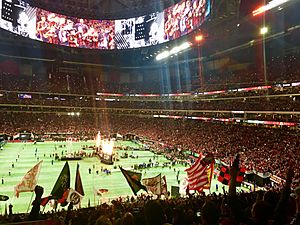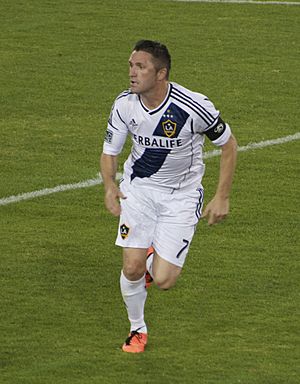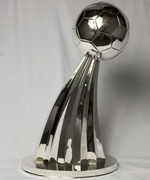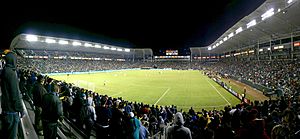MLS Cup facts for kids
 |
|
| Founded | 1996 |
|---|---|
| Region | Major League Soccer (CONCACAF) |
| Current champions | Inter Miami CF (1st title) |
| Most successful team(s) | LA Galaxy (6 titles) |
| Television broadcasters |
|
The MLS Cup is the exciting championship game for Major League Soccer (MLS). It's the grand finale of the MLS Cup playoffs, where the best teams battle it out. This big game usually happens in November or December. It features the top team from the Eastern Conference playing against the top team from the Western Conference. The team that wins the MLS Cup earns the title of league champion!
Unlike most soccer leagues around the world, which crown the team with the most points during the regular season as champion, MLS uses a special playoff tournament. This is similar to how other big sports leagues in the United States and Canada decide their champions. The team with the most points in the regular season in MLS wins a different award called the Supporters' Shield.
The winner of the MLS Cup also gets a special spot in the next season's CONCACAF Champions Cup. This is a big international tournament where top teams from North and Central America and the Caribbean compete.
The very first MLS Cup was played on October 20, 1996. In that game, D.C. United beat the LA Galaxy. The LA Galaxy has been the most successful team in MLS Cup history, winning a record six titles, including their latest in MLS Cup 2024.
Over the years, three different trophies have been used for the MLS Cup. The current trophy, used since 2008, is called the Philip F. Anschutz Trophy.
Contents
History of the MLS Cup
Early Years and Dynasties
The idea for the MLS Cup came from how other major sports leagues in North America decided their champions. In the early years, one team, D.C. United, was incredibly strong. They played in the first four MLS Cup finals and won three of them!
The first-ever MLS Cup in 1996 was a thrilling match between D.C. United and the LA Galaxy. The Galaxy scored two goals early in the second half. But D.C. United fought back, scoring two goals to tie the game. The match went into extra time, and D.C. United scored a "golden goal" to win!
In 1997, D.C. United won again, becoming back-to-back champions. They beat the Colorado Rapids 2–1. This was also the first time an MLS team won both the regular season title (Supporters' Shield) and the MLS Cup in the same year. D.C. United's amazing run continued, winning their fourth title in 1999 against the Galaxy.
California Rivalries and Unexpected Wins
From 2001 to 2005, a big rivalry grew between two California teams: the LA Galaxy and the San Jose Earthquakes. They even met in the 2001 final. The Earthquakes won that game 2–1, with a rising star named Landon Donovan scoring a key goal.
The 2002 final had the biggest crowd in MLS Cup history at the time, with over 61,000 fans watching the New England Revolution play the Galaxy. The Galaxy won their first MLS Cup title in sudden-death overtime. This started a tough period for the Revolution, who would lose several more finals.
The 2003 final was a high-scoring game where the Earthquakes won their second title, beating the Chicago Fire 4–2. This was the highest-scoring MLS Cup final ever!
Sometimes, unexpected teams make it to the final and even win. In 2008, the Columbus Crew won the Supporters' Shield and then went on to win the MLS Cup. Their opponents, the New York Red Bulls, surprised everyone by reaching the final despite having one of the weakest records among playoff teams.
LA Galaxy's Dominance
Between 2011 and 2014, the LA Galaxy had another incredible period of success. They reached three MLS Cup finals and won them all! This made them the first MLS team to win five MLS Cups. Their teams during this time featured famous players like Landon Donovan, Robbie Keane, and David Beckham.
The Galaxy won both the Supporters' Shield and the MLS Cup in 2011, beating the Houston Dynamo 1–0. They faced the Dynamo again in 2012 and won 3–1. This was also David Beckham's last MLS game. The Galaxy continued their winning ways, securing their fifth MLS Cup in 2014 against the New England Revolution.
New Teams Make Their Mark
Newer teams have also made a big impact. The Portland Timbers won the 2015 MLS Cup. The Seattle Sounders FC won their first MLS Cup in 2016 in a penalty shootout against Toronto FC.
In 2017, Toronto FC made history by becoming the first Canadian team to win the MLS Cup. They also achieved a "treble," winning three major titles in one year!

Atlanta United FC, a team in only its second season, won the 2018 edition. This game set a new attendance record for the MLS Cup, with over 73,000 fans watching in Atlanta. It was the city's first professional sports championship since 1995.
The Seattle Sounders FC won their second MLS Cup in 2019, again beating Toronto FC. The 2020 final saw the Columbus Crew win 3–0 against the Sounders.
Watching the MLS Cup
United States and Canada
In the United States, you can watch MLS Cup games on MLS Season Pass through Apple TV. Some games are also shown on Fox and Fox Deportes.
In Canada, TSN and RDS (for French speakers) broadcast the MLS Cup.
How the Playoffs Work
The MLS Cup playoffs have changed a bit over the years. Currently, nine teams from each conference (Eastern and Western) qualify for the playoffs.
The eighth and ninth seeds in each conference play a "wild card" match. The winner of this game then plays against the top-ranked team in their conference. Teams ranked 2 through 7 also play each other.
The first round of these playoffs uses a "best-of-three" series format. This means teams play up to three games, and the first team to win two games moves on. After the first round, the Conference Semifinals, Conference Final, and the MLS Cup final are all single-elimination matches. The team with the better regular season record gets to host these important games.
Sponsorship
Since 2023, the German car company Audi has been the main sponsor of the MLS Cup.
Champions
The MLS Cup winner is crowned the league champion each season. The playoff tournament is organized after the regular season, similar to other major sports leagues in North America. The top nine teams from both the Eastern and Western Conferences get to compete.
The first MLS Cup final was played on October 20, 1996. The LA Galaxy holds the record for the most championships, with six titles. The New England Revolution has reached the final five times but has not yet won the cup. Some teams have even won the championship two or more years in a row!
MLS Cup Titles by Team
| Apps | Team | Champion(s) | Runners-up | Win % | Years of appearance (in MLS Cup Finals) |
|---|---|---|---|---|---|
| 10 | LA Galaxy | 6 | 4 | .600 | 1996, 1999, 2001, 2002, 2005, 2009, 2011, 2012, 2014, 2024 |
| 5 | D.C. United | 4 | 1 | .800 | 1996, 1997, 1998, 1999, 2004 |
| 4 | Columbus Crew | 3 | 1 | .750 | 2008, 2015, 2020, 2023 |
| 4 | Houston Dynamo FC | 2 | 2 | .500 | 2006, 2007, 2011, 2012 |
| 4 | Seattle Sounders FC | 2 | 2 | .500 | 2016, 2017, 2019, 2020 |
| 3 | Sporting Kansas City | 2 | 1 | .667 | 2000, 2004, 2013 |
| 2 | San Jose Earthquakes | 2 | 0 | 1.00 | 2001, 2003 |
| 3 | Chicago Fire FC | 1 | 2 | .333 | 1998, 2000, 2003 |
| 3 | Portland Timbers | 1 | 2 | .333 | 2015, 2018, 2021 |
| 3 | Toronto FC | 1 | 2 | .333 | 2016, 2017, 2019 |
| 2 | Colorado Rapids | 1 | 1 | .500 | 1997, 2010 |
| 2 | Real Salt Lake | 1 | 1 | .500 | 2009, 2013 |
| 2 | Los Angeles FC | 1 | 1 | .500 | 2022, 2023 |
| 1 | Inter Miami CF | 1 | 0 | 1.00 | 2025 |
| 1 | Atlanta United FC | 1 | 0 | 1.00 | 2018 |
| 1 | New York City FC | 1 | 0 | 1.00 | 2021 |
| 5 | New England Revolution | 0 | 5 | .000 | 2002, 2005, 2006, 2007, 2014 |
| 2 | New York Red Bulls | 0 | 2 | .000 | 2008, 2024 |
| 1 | FC Dallas | 0 | 1 | .000 | 2010 |
| 1 | Philadelphia Union | 0 | 1 | .000 | 2022 |
| 1 | Vancouver Whitecaps | 0 | 1 | .000 | 2025 |
The MLS Cup Trophies
After the championship game, the winning team receives a special trophy. This trophy is called the Philip F. Anschutz Trophy. It's named after Philip Anschutz, who has contributed a lot to American soccer and MLS. The trophy is usually presented on a stage in the middle of the field.
Before the trophy is given out, the losing team receives silver medals. Then, the champions get gold medals, and finally, the captain of the winning team lifts the big trophy!
There have been three different MLS Cup trophies throughout history. The first one, used from 1996 to 1998, was the Alan I. Rothenberg Trophy. It was a dark gold trophy with two handles and a soccer ball design. In 1999, the Rothenberg Trophy was redesigned. Then, in 2008, the trophy was changed again to its current design, becoming the Philip F. Anschutz Trophy.
Where the Games Are Played
Many different stadiums have hosted the MLS Cup final. The Greater Los Angeles area has hosted the most matches, with seven games played across different venues. Columbus, Ohio, is second, having hosted four times.
Since 2012, the MLS Cup final is hosted by the team that had the best record during the regular season. This means the final is often played in a team's home stadium, which makes for an exciting atmosphere! For example, in MLS Cup 2022, Los Angeles FC hosted the final because they had a better regular season record than the Philadelphia Union.
Before 2012, the location of the MLS Cup was chosen in advance, sometimes even before the season started. This meant teams rarely played the final in their own stadium. However, D.C. United won at home in 1997, and the LA Galaxy won at home in 2011.
The coldest MLS Cup final was in 2013 in Kansas City, Kansas, where the temperature was 20°F (-7°C). The hottest was in 2005 in Frisco, Texas, at 75°F (23°C).
The 2010 final was the first time the championship game was played outside the United States, taking place in Toronto, Canada.
Stadiums That Have Hosted the MLS Cup
| Name | Location | Hosted | Years hosted |
|---|---|---|---|
| Dignity Health Sports Park | Carson, California | 7 | 2003, 2004, 2008, 2011, 2012, 2014, 2024 |
| RFK Stadium | Washington, D.C. | 3 | 1997, 2000, 2007 |
| BMO Field | Toronto, Ontario | 3 | 2010, 2016, 2017 |
| Historic Crew Stadium | Columbus, Ohio | 3 | 2001, 2015, 2020 |
| Lumen Field | Seattle, Washington | 2 | 2009, 2019 |
| Toyota Stadium | Frisco, Texas | 2 | 2005, 2006 |
| Foxboro Stadium | Foxborough, Massachusetts | 2 | 1996, 1999 |
| Children's Mercy Park | Kansas City, Kansas | 1 | 2013 |
| Gillette Stadium | Foxborough, Massachusetts | 1 | 2002 |
| Mercedes-Benz Stadium | Atlanta, Georgia | 1 | 2018 |
| Providence Park | Portland, Oregon | 1 | 2021 |
| Rose Bowl | Pasadena, California | 1 | 1998 |
| BMO Stadium | Los Angeles, California | 1 | 2022 |
| Lower.com Field | Columbus, Ohio | 1 | 2023 |
| Chase Stadium | Fort Lauderdale, Florida | 1 | 2025 |
Italics indicate a stadium that is no longer used.
Most Valuable Player Award
After each MLS Cup final, a player from the winning team is chosen as the Most Valuable Player (MVP). This award usually goes to a player who scored the winning goal or helped set up many goals for their team.
Sometimes, the MVP award goes to a goalkeeper! This happened in 2000, 2009, 2016, 2021, and 2022. These goalkeepers made amazing saves or performed brilliantly in penalty shootouts to help their teams win the championship.
List of MLS Cup MVP Winners
| Year | Winner | Position | Club |
|---|---|---|---|
| 1996 | Midfielder | D.C. United | |
| 1997 | Forward | D.C. United | |
| 1998 | Midfielder | Chicago Fire | |
| 1999 | Midfielder | D.C. United | |
| 2000 | Goalkeeper | Kansas City Wizards | |
| 2001 | Forward | San Jose Earthquakes | |
| 2002 | Forward | LA Galaxy | |
| 2003 | Forward | San Jose Earthquakes | |
| 2004 | Forward | D.C. United | |
| 2005 | Midfielder | LA Galaxy | |
| 2006 | Forward | Houston Dynamo | |
| 2007 | Midfielder | Houston Dynamo | |
| 2008 | Midfielder | Columbus Crew | |
| 2009 | Goalkeeper | Real Salt Lake | |
| 2010 | Forward | Colorado Rapids | |
| 2011 | Forward | LA Galaxy | |
| 2012 | Defender | LA Galaxy | |
| 2013 | Defender | Sporting Kansas City | |
| 2014 | Forward | LA Galaxy | |
| 2015 | Midfielder | Portland Timbers | |
| 2016 | Goalkeeper | Seattle Sounders FC | |
| 2017 | Forward | Toronto FC | |
| 2018 | Forward | Atlanta United FC | |
| 2019 | Midfielder | Seattle Sounders FC | |
| 2020 | Midfielder | Columbus Crew | |
| 2021 | Goalkeeper | New York City FC | |
| 2022 | Goalkeeper | Los Angeles FC | |
| 2023 | Forward | Columbus Crew | |
| 2024 | Midfielder | LA Galaxy | |
| 2025 | Forward | Inter Miami CF |
Players with Multiple MLS Cup Wins
Many players have won the MLS Cup more than once. Some have won it with the same team during a successful period, like D.C. United in the late 1990s or the LA Galaxy in the 2010s.
Landon Donovan holds the record for the most MLS Cup titles, with an amazing six wins! Some players have even won the Cup with different teams, showing their skill and adaptability.
| MLS Cups | Players (years won) |
|---|---|
| 6 | Landon Donovan (2001, 2003, 2005, 2011, 2012, 2014) |
| 5 | Jeff Agoos (1996, 1997, 1999, 2001, 2003) Todd Dunivant (2003, 2005, 2011, 2012, 2014) Brian Mullan (2002, 2003, 2006, 2007, 2010) |
| 4 | Jaime Moreno (1996, 1997, 1999, 2004) Craig Waibel (2002, 2003, 2006, 2007) Dwayne De Rosario (2001, 2003, 2006, 2007) Eddie Robinson (2001, 2003, 2006, 2007) Josh Saunders (2003, 2005, 2011, 2012) Darlington Nagbe (2015, 2018, 2020, 2023) |
| 3 | Richard Mulrooney (2001, 2003, 2007) Marco Etcheverry (1996, 1997, 1999) Brian Kamler (1996, 1997, 1999) John Maessner (1996, 1997, 1999) Clint Peay (1996, 1997, 1999) Eddie Pope (1996, 1997, 1999) Richie Williams (1996, 1997, 1999) Chris Albright (1999, 2002, 2005) Brian Ching (2003, 2006, 2007) Jesse Marsch (1996, 1997, 1998) Alejandro Moreno (2002, 2006, 2008) Ezra Hendrickson (2002, 2004, 2008) Pat Onstad (2003, 2006, 2007) Chad Marshall (2008, 2016, 2019) Juninho (2011, 2012, 2014) Omar Gonzalez (2011, 2012, 2014) Robbie Keane (2011, 2012, 2014) A. J. DeLaGarza (2011, 2012, 2014) Leonardo (2011, 2012, 2014) Hector Jiménez (2011, 2012, 2020) |
Images for kids
-
Landon Donovan of San Jose defending against Chicago's Carlos Bocanegra in the 2003 MLS Cup.
See Also
 In Spanish: MLS Cup para niños
In Spanish: MLS Cup para niños
- MLS Cup Playoffs
- MLS rivalry cups
- Campeones Cup
- CONCACAF Champions League
- List of MLS Cup broadcasters
- List of MLS Cup finals
- List of MLS club post-season droughts
- List of MLS Cup referees
- List of MLS Cup winning head coaches
 | James Van Der Zee |
 | Alma Thomas |
 | Ellis Wilson |
 | Margaret Taylor-Burroughs |









